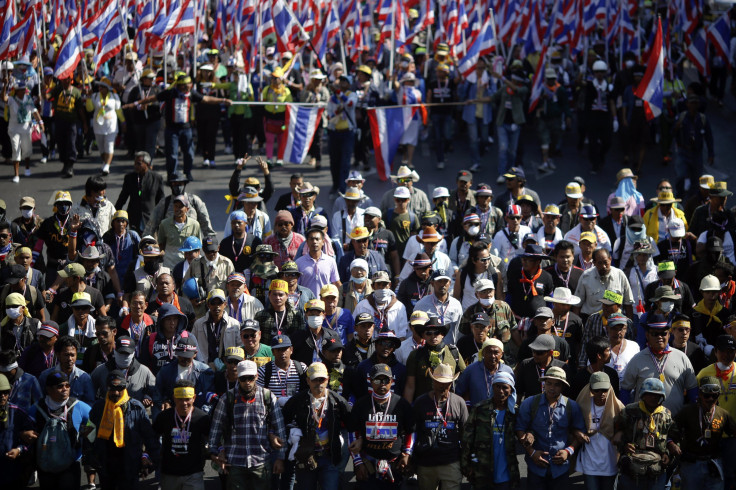Thailand Economic Outlook 2014: Political Tension Could Resolve In 4 Ways, None Allowing More Than 3% Of GDP Growth

Thailand’s political unrest, which has been ongoing since October, is looking increasingly less likely to be resolved peacefully. The best-case scenario would see the Thai economy grow about 3 percent this year, analysts say, while the worst could plunge the Southeast Asian nation into a recession.
Unfortunately, political tensions in Thailand, instead of showing signs of petering out in the New Year, have become increasingly escalated. The caretaker government declared a state of emergency in Bangkok yesterday, and while the Feb. 2 election is scheduled, it remains to be seen whether it will actually take place, according to a research note from Capital Economics.
In the best-case scenario, the election would proceed with the two sides -- the Pheu Thai Party-led caretaker government and the People’s Democratic Reform Committee (PDRC)-led protesters -- coming to an agreement beforehand on reforms and to respect election results. The Pheu Thai Party would likely win, and it will then need to address the grievances of the protesters, including greater efforts to fight corruption and a reduction of populist programs like the rice subsidy scheme.
If political stability is achieved, Thailand could still scrap together more than 3 percent of economic growth in 2014. However, this scenario is almost certainly too optimistic.
“At this point, it is difficult to envision such a compromise,” Capital Economics analysts Krystal Tan and Daniel Martin wrote. “However, escalating violence could create greater urgency for a deal.”
A more likely scenario is that the opposition will challenge the results of the election, either legally or through protests. Continuing conflicts would further undermine economic confidence, and restrain public spending, which is essential to the roll-out of key public infrastructure projects. If an agreement can be reached by the second quarter, the Thai economy could grow by 2-3 percent. Otherwise, growth could be stunted to below 2 percent.
If election is delayed, the economic implication would be similar -- growth would largely depend on when an agreement can be reached by the two sides on reforms and elections.
In the worst-case scenario, the conflict would not be resolved until the military steps in. In the case of a coup, which could trigger retaliation from pro-government supporters, the country would be thrown into chaos, resulting in a grave economic outlook for the year, among other detrimental effects.
“A protracted period of unrest could drag the economy into recession,” according to Capital Economics. “We also now think it is unlikely that growth will exceed 3 percent this year.”
© Copyright IBTimes 2024. All rights reserved.




















